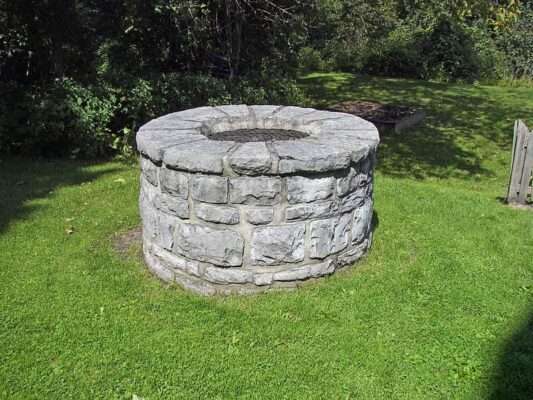Is it your first time in a house with a water well? Here is everything you must know before moving to a house with a well.
Pre-Purchase Inspection
Hire a licensed contractor to do a pre-purchase inspection of the water well. It will help you know the condition of the water well, its equipment, how much repair they need, and how long the well hasn’t been used.
The contractor will also verify that the well has been built according to the local laws and there is proper distance between your well, septic tank, chemical and manure storage, dry wells, and dump sites.
A detailed pre-inspection might cost you a few bucks, but it will help you identify potential problems with the well and negotiate the property price in a better way.
The inspection report must also cover how old the pumps and water tank are. When was the last time the pump was tested and is there any visible corrosion, repairs, or damage to the plumbing system?
Do the well casing and well screen meet state and local codes? Are these things made with state-approved materials? Are there any holes or cracks in the casing? Is the well cap vermin-proof and not broken or damaged?
These things will estimate how much you will need to spend on the well system once you buy the home.

Water Cost
You don’t have to pay anything for the water you use from the well. However, its maintenance is your responsibility. You’ll have to take care of the well, pump, pressure tank, and all the other equipment.
Well water needs to be tested annually or whenever there is a change in water quality (taste, smell, and color). The cost to treat well water depends on water quality, usage, and the filters (size, capability, & capacity) you install.
Well’s Current Condition
The points below will help you understand the water well’s current condition, how long it will last, how much water it has, and the flow rate.
When was the well drilled? The current homeowner and realtor can answer this question. You can also access the well-record from the city council. A Water well typically lasts for 20-50 years, depending on well depth, water availability, and usage pattern.
Well Depth: A residential well is usually 100-800 feet deep in the US. Some wells may be 25-50 feet deep, depending on the water level in the aquifer.
Replenishment Rate: A healthy water well replenishes at a rate of 4-6 gallons per minute. The rate may vary depending on well depth, underground water level, pump health, well-screen condition, and usage pattern.
Overall Well Capacity: The well capacity is a subjective term. The appropriate water capacity depends on how many people are using the well. An average household uses 80-100 gallons of water per person daily. So, ask about the well’s production capacity and compare it with your family’s needs.
You may need to water lawns, wash vehicles, fill swimming pools, and feed your pets. Though these things are not done regularly, you must keep this in mind.
Abandoned Wells: You must also check if there are any abandoned wells on the property and whether they have been properly sealed.

Water Quality
Before moving to a new home, you must know about the well water’s quality. Don’t forget to check that the systems (filters & softeners) installed by the previous or current owner are working properly. Some things to consider here are explained below.
Current Use Status: Is the home currently occupied, and are the homeowners using well water for drinking and cooking? An unused well is more prone to contamination than a well being used.
Water Testing: Is the water regularly tested, and is there a record of previous testing? Most people getting water tested from a lab will have testing logs. You can also ask the current occupants about contaminants in the water if they test the water using DIY test kits.
Please note that water testing is the only reliable way to find the contaminants in water. It will help you know which filters you have to install.
You can also get the water tested on your own. Make sure you go for an extensive test that covers the following.
- Contaminants
- Minerals
- Hardness
- pH
- Turbidity
- Volatile Organic Compounds (VOCs)
- Total Dissolved Solid (TDS)
- Radioactive materials
Chlorination: When was the well chlorinated last time? Chlorination kills microorganisms such as bacteria and viruses in water. Most experts recommend chlorinating water every 3-5 years, after the well is repaired or modified. This information will help you know whether you must chlorinate the well before moving.
Some homes also have UV purification systems installed to kill pathogens in water.
Potential Problems with Well Water
- Well water comes from underground and is not treated like city water. It is prone to contamination, and you’ll have to ensure that your filtration systems always perform optimally to maintain water quality.
- Well water is hard. Hard water is bad for your skin, hair, appliances, and plumbing fixtures. Hence, you’ll require a water softener to make well water soft.
- Well water is rich in iron. Iron usually causes orange/brown stains on bathroom fixtures and kitchen sinks. You’ll have to remove iron before well water enters your home.
- Well water requires annual testing to help you upgrade the filtration systems. You’ll also need to test the water after a sudden change in water quality, floods, or if you are moving out for a few months.
How can I Increase the Water Quantity from a Well?
You can deepen the well, go for hydrofracking or drill a new well at your property. You must consult a local contractor to increase the water quantity from a well. Drilling a new well is the most costly option but is the most reliable. The average cost to drill a new well varies from $1,500 to $13,000.
Can I Revive Old Water Well at my Property?
Yes. You can revive an old well unless there is no restriction by the local government. You can ask the previous owner or from the local government office. Hire a professional to revive an old well at your property and ensure that all the work is done according to the local laws.
